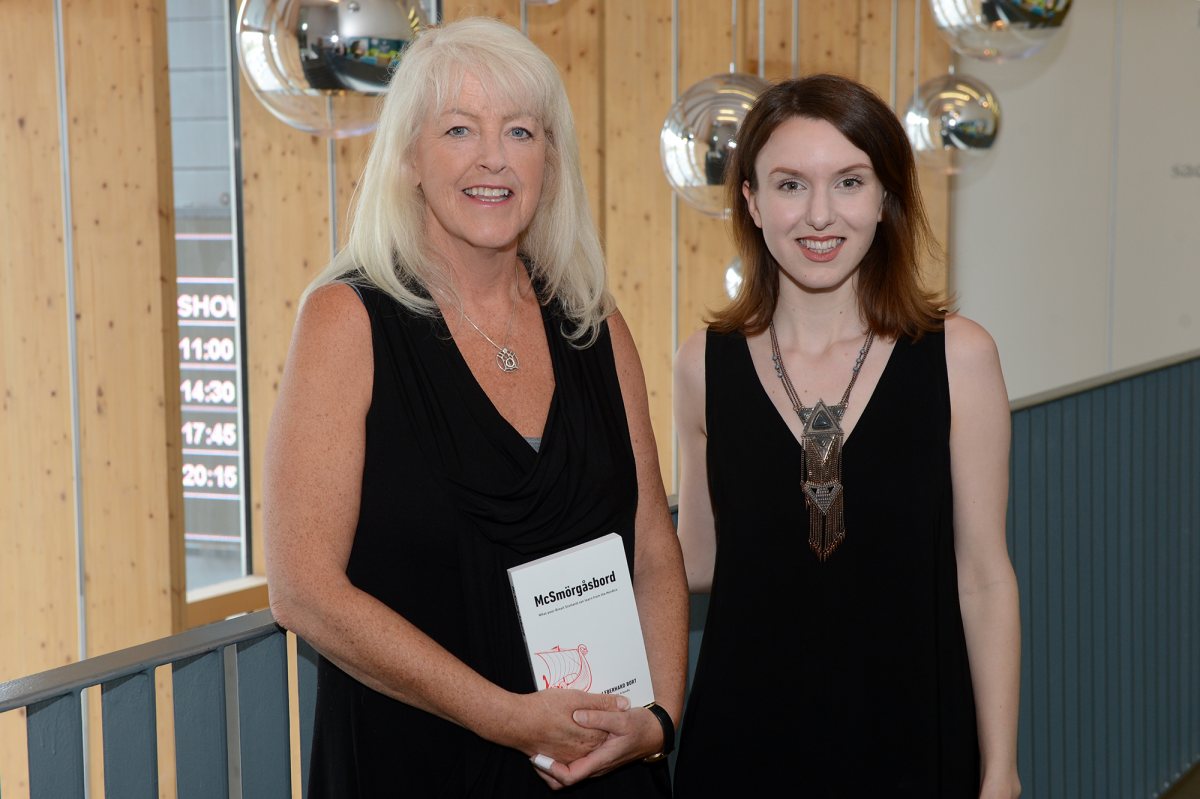Riddoch and Brett look to Scandinavia for political inspiration
By ALEX GARRICK-WRIGHT
Normal election issues were set aside in favour of discussing the impact of Brexit, and Scotland’s place as an “Arctic nation” at an unusual event on Monday.

Author and broadcaster Lesley Riddoch and SNP candidate for Orkney and Shetland Miriam Brett spoke to a small but energised lunchtime crowd in Mareel for the event, which was organised by Women for Independence (although men were welcome).
Riddoch mentioned her work with Nordic Horizons, an informal group of Scottish professionals that looks at how Nordic countries deal with various issues, and presented her new book, McSmorgasbord, a collaboration with a number of academics examining Scotland’s options for emulating Nordic countries post-Brexit.
In a fiery and confident talk, Riddoch explained that when it came to relationships with the EU, Nordic countries had “in, out, and shake-it-all-about”, with various countries having different approaches to the bloc, especially the various constituent parts of Denmark.
She particularly compared Shetland to the Faroe Islands, which she described as “18 granite lumps sitting in the North Atlantic… with the most devolved parliament in the world.”
The Danish islands achieved extensive home rule after a close referendum on independence in 1948 (which saw 50.7 per cent vote in favour).
In order to compromise with the islands, Denmark offered the Faroese their own parliament, complete autonomy on a number of issues, including taxes, energy and telecoms, and the authority to sign international treaties. This, Riddoch said, was a situation which caused issues when Denmark voted to join the EU, but Faroe did not.
Faroe remained a part of Denmark which was outside the EU; a position soon shared by Greenland, which left the union after becoming autonomous in the 1980s.
Iceland, which declared independence from Denmark in 1944, never joined the EU, but was able to access the European Economic Area (EEA) as a member of the European Free Trade Association (EFTA). This has allowed them to pay to access the single market, as well as having to adopt freedom of movement. Crucially, Iceland’s status as an EFTA member means they do not have to participate in the controversial Common Fisheries Policy, Common Agricultural Policy or Customs Union, which Riddoch noted may be of interest to Shetlanders.
Norway’s reluctance to join and Finland’s use of EU membership as security against Russian aggression were, she said, further examples of the flexibility and variety of ways of being a part of Europe. Riddoch derided the UK government’s “our way or the highway” approach.
“It’s a shame, but life’s more complicated than that,” she said.
The arrogance and swagger of the UK government [has] significantly hampered our negotiating position with the EU. MIRIAM BRETT
Brett, an economic advisor to the SNP Westminster group, echoed Riddoch’s call for looking at alternative ways of Scotland existing within the European framework, commenting on the “deeply sinister” way in which the UK government called the upcoming election to secure a stronger mandate for their “hard-Tory Brexit”.
“The Conservatives didn’t really have a mandate to bulldoze through what is quite a frightening agenda,” she said.
“[We] can see the complete demise of Ukip, but why would you vote Ukip when the Conservatives have adopted their entire manifesto?”
The 25-year-old Shetlander said it was imperative that the Scottish public’s decision to stay in the EU should be respected, and noted that the Scottish government had presented the UK government with a wide spectrum of options on Scotland’s continuing relationship with the EU – including those similar to the above models – in a report called Scotland’s Place In Europe. The report, Brett said, was dismissed by the UK government.
She went on to discuss what she felt were the most significant impacts of Brexit for the isles, notably immigration, the loss of EU funding, and trade. While she noted the serious effect a clampdown on immigration will have on a number of industries, she was troubled by the rhetoric that had been used by the UK government.
“The UK is increasingly geared toward the ‘Little Britain’ model. Brexit opens the door to what kind of country we want to be…
“The arrogance and swagger of the UK government [has] significantly hampered our negotiating position with the EU. It’s baffling we could negotiate successfully with the EU at the moment.
“Brexit changed the way people see politics. I can’t help but feel nervous about the trajectory we’re on; is this the route we want to go down?”
More in Friday’s Shetland Times.







John Tulloch
Nice to hear Ms Riddoch has arrived at the same conclusion as WIr Shetland, namely, that the Faroese constitutional position is an enviable one. If it’s good for Faroe, why not for Shetland?
As for Ms Brett’s contribution, If Brexit will be such a bad idea for Shetland, why did Greenland leave the EU and similarly fishing-orientated Shetland neighbours, Iceland and Faroe, refuse to join?
Graham Fleming
Mr Tulloch the Faroes Greenland and Iceland are not British crown dependencies they are free democracies. The Wir Westminster format would soon degenerate,like into its nirvana in the North east of Ireland. Scottish Shetlanders(and others) should always look before they lowp(or be pushed) into such nonsense.
Charles tait
It is blindingly obvious that Orkney and Shetland would be vastly better off with a similar status to the Faeroes, IOM or CI, or indeed Bermuda. The vast resources north of a line at around 58 degrees 40.5 min north include fisheries, oil, gas, marine renewables and offshore wind. There are also huge opportunities to develop sustainable tourism and agriculture, as well as offshore financial services. Of course neither the UK nor an “independent” Scotland could possibly thole such a prospect.